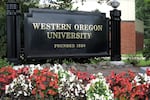Western Oregon University has been serving people who are deaf and hard of hearing across the state for roughly half a century. The public university based in Monmouth is now expanding on that work by offering two new certificates for American Sign Language aimed at professionals who might work with state agencies, and in educational or community settings. The university says the certificates will be the first of their kind in the region.
“Western believes strongly in trying to be an innovator, a leader and an advocate for deaf and hard of hearing children, families and the community,” Mark Girod, dean of WOU’s College of Education, told OPB.
A lot of the university’s work has come from its Research & Resource Center with Deaf* Communities — a center housed in Western’s College of Education with a mission to provide education to workers and the public so they can better respond to the needs of people who are deaf and hard of hearing, and conduct research and obtain grants to do that. The asterisk in the center’s name is an attempt to make the term “deaf” more inclusive, as it could include people who have lesser hearing loss or have additional disabilities.
Some of the university’s past work includes involvement in training interpreters for a new language for deaf-blind people, called Protactile.
The new certificates find their roots in a state-funded study from 2016, which WOU’s research center conducted on the needs of deaf and hard of hearing communities in Oregon. Girod said that the report revealed numerous barriers deaf and hard of hearing communities face, including discrimination, difficulties finding interpretation and limited access to mental health services.
“[The study] was one of the things that really reiterated that despite our best efforts, there is a segment of Oregonians who struggle to access support, social services, employment opportunities,” Girod said. “So Western has tried to play a role in that setting.”
These new ASL certificates will help address some of that need, he said. They will not only focus on ASL language skills but on deaf culture and history, and are aimed at giving people the skills to better support people who are deaf and hard of hearing.
Girod said that WOU’s research center regularly receives inquiries from state and regional agencies, like emergency services, about translation services and educational opportunities.
“When you show up at a trauma and there are deaf and hard of hearing individuals, what would be the appropriate and supportive protocols to put into place for your agency?” Girod explains as some of the questions agencies look to WOU for. “We have a long history of doing that kind of work, and that’s been super positive.”
Girod said these certificates could be a clear way for state workers to build on their skills and allow state services to more effectively reach people who are hearing impaired.
“What I’m hopeful of, frankly, is if several of our big state agencies say, ‘Hey, you know what, we believe in this strongly enough that we’re going to pay for a subset of our employees to learn these skills and become more functional in our ability to serve deaf and hard of hearing Oregonians,’” Girod said.
Girod said the certificates could also help anyone who works in a job that is focused on human interaction, including educators who work with deaf and hard of hearing children.
WOU will begin offering the certificates this fall — one beginner and one intermediate program.
The certificates will build on basic ASL skills, including coursework offered at community colleges across the state.
The certificates could also lead into existing programs and degrees at Western including majors and minors in American Sign Language and a graduate program in interpreting studies.
Girod said it’s unclear yet how many students will be enrolled in the newly-announced certificate programs this fall.
“One of the things I think we’ve learned over time is that there is an interest,” he said. “We’ll see if there’s also a market.”

Western Oregon University
Rob Manning / OPB
